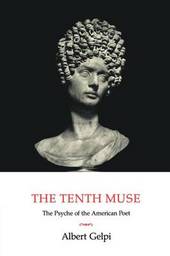
|
The Tenth Muse: The Psyche of the American Poet
Paperback / softback
Main Details
| Title |
The Tenth Muse: The Psyche of the American Poet
|
| Authors and Contributors |
By (author) Albert Gelpi
|
| Physical Properties |
| Format:Paperback / softback | | Pages:358 | | Dimensions(mm): Height 234,Width 156 |
|
| Category/Genre | Poetry
Literary studies - from c 1900 -
Literary studies - poetry and poets |
|---|
| ISBN/Barcode |
9780521424011
|
| Classifications | Dewey:811 |
|---|
| Audience | | Professional & Vocational | |
|---|
| Illustrations |
4 Maps; 13 Halftones, unspecified; 1 Line drawings, unspecified
|
|
Publishing Details |
| Publisher |
Cambridge University Press
|
| Imprint |
Cambridge University Press
|
| Publication Date |
27 September 1991 |
| Publication Country |
United Kingdom
|
Description
In The Tenth Muse, Albert Gelpi asks the hard questions about how poetry can take on for itself the problems of shaping American identities and argues that the conditions of American life and culture have pushed our major poets into a debate between intellect and passion. Gelpi provides thorough readings of major American poets from Bradstreet and Taylor up to the modernists, often using contemporary poets (Rich, Ginsberg, Duncan) as frames for those predecessors. Originally published in 1975 in hardcover only by Harvard University Press
Reviews"Mr. Gelpi, with brief glances at other poets in addition to the major five under especial scrutiny, illustrates his discussions with analyses of individual poems. His interpretations are often complex and brilliant and it is impossible to do justice to them in a short review. I found his discussion (and his distinction between) types and tropes as they appear in Taylor and in the later nineteenth-century poets and his interpretation of Dickinson's circumference poems as well as her use of sun, moon, and other basic symbols as they relate to the Demeter-Persephone-Kore archetype (as explicated by Jung, Neumann, and Kerenyi) particularly helpful." Donald E. Stanford, American Literature "Albert Gelpi's The Tenth Muse, has given us a strong, suggestive, and revealing book, exquisitely successful in the balance it offers of specific example, modest statement, and guarded psychological interpretation, on the one hand, and on the other hand, broad social history." Robert Coles, Studies in Romanticism
|